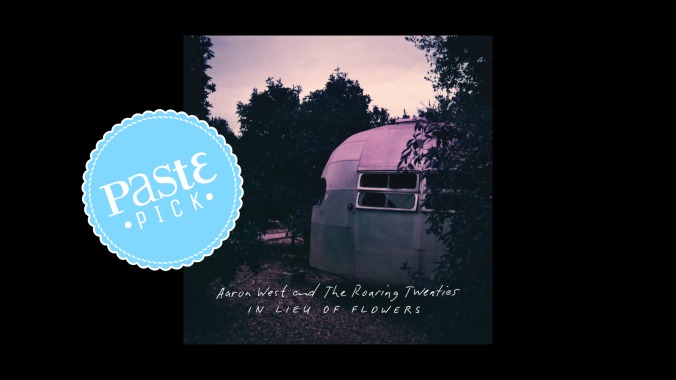In Lieu of Flowers Makes Good on the Promise of Aaron West and the Roaring Twenties
The Wonder Years’ Dan Campbell returns to his beloved Upstate New Yorker persona with another collection of strong, rock-bottom folk songs.

On Live at the Austin Outhouse, Texas country legend Blaze Foley’s haunting, lasting live album, you’re able to hear bits and pieces of background noise push through Foley’s fingerpicking and his deep, warming voice. The bar-goers rustle, a beer bottle clinks here and there, and brief conversations take place as Foley sings “Clay Pigeons.” In Ethan Hawke’s Blaze, a rare music biopic equally unique and wonderful, the Outhouse sequence shows pool games taking place, blank stares from the crowd and Foley wandering around—until a door opens to reveal that it’s daylight out. A captive audience this was not.
The character of Aaron West has played to crowds like this for years. As the frontman for Philadelphia pop-punk five-piece the Wonder Years, Dan Campbell has grown comfortable with hearing hundreds of people sing his lyrics back at him every night. His side-project, Aaron West and the Roaring Twenties, is a character study about a songwriter hitting rock bottom—a path that Campbell has managed to avoid. With the project’s latest album, In Lieu of Flowers, the nonplussed audience makes an appearance. Campbell’s acoustic guitars and sighed lyrics on “Smoking Rooms” are surrounded by low chattering, the kind of ambiance you’d hear in a bar that’s a little busier than expected. This is a risky choice—it could be didactic to kick the album off with West’s confessional songs being ignored so literally—but it pays off in a sudden eruption of electric guitars and saxophones. It’s an early and critical example of In Lieu of Flowers’s surprising hopefulness, an indicator that these songs just can’t be ignored.
Aaron West and the Roaring Twenties has always been an ambitious project, an attempt to turn Campbell’s gifted, vivid pop-punk storytelling into something that has literary seriousness and folk songster credibility. In the past, Campbell has sometimes struggled to balance the character’s miserable backstory and his melodic levity, particularly because that tonal balance is what makes the Wonder Years such a remarkable band. Parts of the Roaring Twenties’ debut, We Don’t Have Each Other, are so literal about Aaron West’s divorce, his unborn child and the death of his father that Campbell’s lyrics occasionally erode the album’s emotional potency. But since 2016’s Bittersweet EP, the home of this project’s crown-jewel “67, Cherry Red,” Aaron West and the Roaring Twenties has been about slow recovery. 2019’s Routine Maintenance found West traveling across the country, forming a country band and eventually learning to be there for his family—especially after his sister’s husband passes away.
-

-

-

-

-

-

-

-

-

-

-

-

-

-

-

-

-

-

-

-

-

-

-

-

-

-

-

-

-

-

-

-

-

-

-

-

-

-

-

-








































